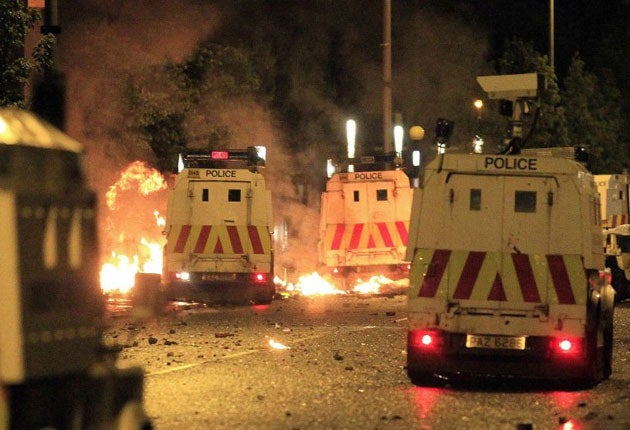Dissidents blamed for Belfast riot shooting

Guns were back on the streets in Belfast tonight after three people were shot during the most serious rioting in Northern Ireland for years.
Dissident republicans are suspected of firing live rounds which injured a press photographer in the leg, while two other men suffered bullet wounds amid two nights of violence in the east of the city.
A barrage of petrol bombs, missiles and fireworks were thrown at security force lines yesterday with two men suffering burn injuries and officers firing dozens of plastic bullets.
A woman aged 20 has been arrested on suspicion of possessing an offensive weapon and assaulting police.
Police said the loyalist paramilitary Ulster Volunteer Force (UVF) had orchestrated the trouble.
Assistant Chief Constable Alistair Finlay said: "This is a bad thing for the community, this is a bad thing for Northern Ireland.
"We need to bring an end to this needless violence, violence which has put lives at risk."
Rioting broke out on Monday night amid UVF violence against Catholic homes in the Short Strand.
Missiles were hurled between nationalists and unionists on the nearby Lower Newtownards Road, the police intervened and became targets. Two men were taken to the Ulster Hospital with gunshot wounds.
Last night trouble began shortly before 9pm after large crowds gathered at the same East Belfast interface.
Masked youths used sledgehammers to try and smash through police vehicles and jumped onto bonnets in an attempt to rip off the protective metal guards.
Masonry, petrol and paint bombs and other missiles were hurled at officers and water cannon vehicles were brought in.
A spokeswoman for the Police Service of Northern Ireland (PSNI) said detectives believed dissident republicans were responsible after a Press Association photographer suffered a gun shot wound to his right leg. He went to the Royal Victoria Hospital in Belfast, where his condition was described as stable.
Dissidents have been responsible for a string of attacks on members of the security forces. In April they planted an under-car explosive device which killed Constable Ronan Kerr, 25, outside his home in Omagh, Co Tyrone.
Talks with East Belfast community representatives are being held in an effort to secure an end to the violence. Democratic Unionist First Minister Peter Robinson has offered to help.
Mr Finlay said: "The UVF in East Belfast started this - there was no sense of anyone trying to finish that.
"Their hands are upon this, whether by direction, by omission or commission."
The Progressive Unionist Party has links to the UVF. Its representative John Kyle said there had been sporadic brick-throwing for some time.
"There has been a background level of simmering violence," he said.
"This sort of low level of violence has not really been addressed by the security forces or by the community organisations, so that has led to building tension and pressure."
The loyal order marching season is approaching its peak next month, traditionally a time of heightened street conflict.
The UVF is one of the biggest loyalist groups and, despite having observed a ceasefire and decommissioned its weapons, it was blamed for a murder last year.
A paramilitary watchdog found that the UVF's leadership sanctioned what was branded the "public execution" of loyalist Bobby Moffett, who was shot dead in front of shoppers on Belfast's Shankill Road.
But the Independent Monitoring Commission (IMC) stopped short of recommending Government sanction of the UVF.
The recent appearance of UVF murals in east Belfast depicting masked and armed men was seen as a bid by the group to stamp its mark.
The location of this week's riots is an inner-city area, not far from the centre of Belfast, and has been a long-standing flashpoint.
The Short Strand is a small Catholic community in the predominantly Protestant east of the city.
Bookmark popover
Removed from bookmarks